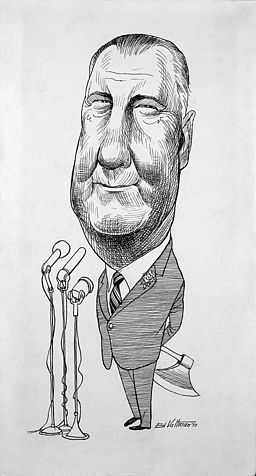Bury the Hatchet

A 1970 caricature by Edmund S. Valtman of Vice President Spiro T. Agnew, who was widely recognized as President Nixon’s “hatchet man” in dealing with the press.
A scene from the 1983 film The Right Stuff, directed by Philip Kaufman, in which the 7 Mercury astronauts assert their priorities over those of NASA scientists by pointing out their leverage with the press.
Theodore Roosevelt was a rarity in that he cultivated a cordial relationship with the press, all the more to get them on his side when he used the Bully Pulpit to push his favored policies through Congress. His distant cousin, Franklin Roosevelt, went even further in developing good relations with the press, personally conducting twice weekly off the record briefings in the Oval Office. As briefings and presidential press conferences became more common through the twentieth century, people came to accept them as an indication of openness and a window into the executive branch, however distorted and murky the view might be. At least there was communication, and official positions could be known by the press and public.
Now this administration wants to pull down the shades on its workings. It makes no difference that Mr. Spicer is being replaced by Ms. Sanders. It hardly makes any difference that briefings are fewer and characterized by disrespect for the press, since this administration has demonstrated openly its contempt for norms of civil political discourse. When you know you will be lied to and treated shabbily, why stand there and continue to take it? Sooner or later, even the most profit hungry of the media outlets may abandon the White House press briefing as a source of anything other than insubstantial blathering worthwhile only as a target for satire. This administration may then find out, if the people in it are capable of learning anything at all, that if no one is taking seriously their side of any story or even listening, then there is no more spin control. With a little self control, the press may even stop giving undue attention to the daily distraction of outrageous tweets issuing from the Oval Office, and start paying attention to the important issues affecting this country.
― Vita 
